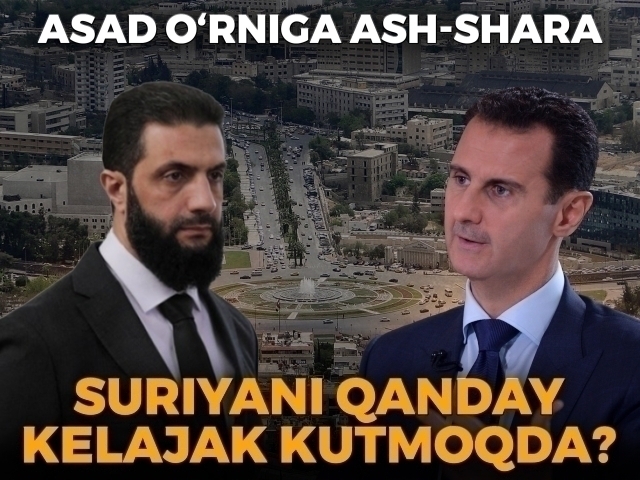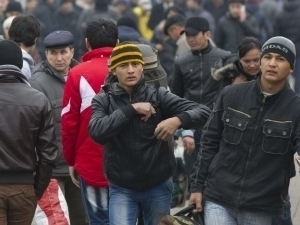Al-Shara overthrows Assad: What comes next for Syria?
Review
−
06 February 2025 8189 6 minutes
The day after he was announced as the new interim president of Syria, former leader of Hayat Tahrir al-Sham Ahmed al-Shara (Abu Muhammad al-Julani) addressed the nation with his first presidential speech.
“In the coming days, we will announce the formation of a committee tasked with preparing a National Dialogue Conference, which is intended as a forum for discussions to hear different points of view on the future political program,” he promised in a televised speech on January 30.
According to him, the results of this conference will serve as a platform for the country’s new “Constitutional Declaration” and will help develop a “roadmap” for Syria’s future political development.
“The priority of Syria is to fill the government vacuum through legal and legitimate means,” said the new interim president.
He also announced the dissolution of the Syrian parliament and the end of the constitution adopted under former President Bashar al-Assad in 2012.
In addition, al-Shara announced the dissolution of both the Syrian army and the armed groups that participated in the overthrow of Assad, including Hayat Tahrir al-Sham itself. In the future, all of Syria’s armed forces – except the US-backed Kurdish Syrian Democratic Forces (SDF) in the northeast of the country – will be organized as a single national army.
London-based journalist and analyst Manhal Barish said that none of these solutions would be implemented at this stage.
“The interim president has neither the right nor the authority to form a legislative council. These steps can only be taken by an elected administration,” he said.
Barish sees the Syrian transitional government and its decisions, approved by national and international actors, as acts of goodwill aimed at “giving a chance for legitimacy at this stage.”
Minorities Appear to Have a Role
The call for a National Dialogue Conference is important, said Nanar Khawach, senior Syria analyst at the International Crisis Group, but key questions remain about who will participate, how members will be selected, and whether elections will be held. When it comes to protecting the rights of women and minorities, Khawach is hopeful about al-Shara’s promise to “work towards an inclusive transitional government that reflects Syria’s diversity.”
“The Syrian interim government understands the complexity and diversity of Syrian society and that it cannot impose its views on all Syrians,” he said.
Khawach added that it was not yet clear “how deep” this understanding goes.
Economic Developments in Syria
The announcement of a new interim government in Syria has accelerated international efforts to stabilize the country financially. Last week, European Union foreign ministers lifted some of the sweeping EU and US sanctions imposed on Syria in 2011. Until then, the country had been virtually cut off from the global economy.
In addition, a group of 22 countries, including the US, Qatar, Saudi Arabia, and the Arab League, have announced their support for the new Syrian government.
Meanwhile, al-Shara remains on the US list of most-wanted terrorists, with a $10 million reward for his capture. Hayat Tahrir al-Sham is still considered a terrorist organization by the United Nations and the United States, as the group has previously been linked to ISIS and al-Qaeda.
Syria itself is also struggling to improve its dire economic situation. Under the Assad clan, Syria's state economy was riven by nepotism and corruption for 50 years.
"We expected corruption, but not to this extent," Syria's new interim finance minister, Mohammed Abazid, told Reuters last week.
He said that of the 1.3 million people who receive state salaries, only 900,000 go to work. Accordingly, the new government's next step will be to lay off a third of those employed in the public sector. Abazid also announced plans to privatize more than 100 loss-making state-owned industrial enterprises.
“We are also working to simplify the tax system and remove obstacles to encourage investors to return to Syria,” he said.
Syria Remains Unstable
Despite the prospect of an economic recovery, Syria’s interim president, Ahmed al-Shara, knows that rebuilding the country will not be easy.
“The mission of the victors is difficult and their responsibility is enormous,” he said in his first speech.
The humanitarian situation in Syria is worsening, with 16.7 million people in need of humanitarian assistance last year, the highest number since the crisis began in 2011, according to the UN Office for the Coordination of Humanitarian Affairs (OCHA).
Another 25,000 people were forced to flee their homes in northeast Syria last week, where fighting between the US-backed Kurdish Syrian Democratic Forces (SDF) and the Turkish-backed Syrian National Army (SNA) has continued. However, with al-Shara’s decision to formally disband the SNA along with other armed groups, it remains to be seen whether the parties will engage in negotiations.
According to the UN Special Envoy for Syria, Geir Pedersen, the new Syrian administration will not change the objectives of the UN mission.
“The UN Secretariat does not deal with documents on the recognition of governments; that is a decision of intergovernmental bodies,” said Jennifer Marie Vaughan, Pedersen’s spokeswoman.
According to her, the UN continues to support a Syrian-led and Syrian-owned political transition that meets the legitimate aspirations of the Syrian people, by the basic principles set out in UN Security Council Resolution 2254, including the formation of a transitional government, the development of a new constitution, and the holding of free and fair elections.
We recall that Ahmed al-Shara (Abu Muhammad al-Jolani), who took power in Syria in December 2024, was declared the country’s interim president on January 29 of this year. On February 2, he made his first foreign visit to Saudi Arabia. As part of this visit, he met with Saudi Crown Prince and Prime Minister Mohammed bin Salman Al Saud in Riyadh. On February 3, he performed the Umrah pilgrimage in Mecca. The doors of the Kaaba were also opened to him.
Al-Shara's second foreign trip was to Turkey. Al-Shara thanked Erdogan for the positive atmosphere during the negotiations and invited the Turkish President to visit Syria as soon as possible. Ahmed al-Shara is now expected to visit Paris in the coming weeks at the official invitation of French President Emmanuel Macron.
Live
All





